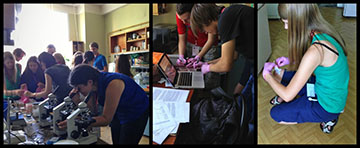EMBO is an organization of more than 1500 leading researchers that promotes excellence in the life sciences, especially in molecular biology. The major goals of the organization are to support talented researchers at all stages of their careers, stimulate the exchange of scientific information, and build a European research environment where scientists can achieve their best work. It helps young scientists to advance their research, promote their international reputations and ensure their mobility. Courses, workshops, conferences and scientific publications disseminate the latest research and offer training in techniques to maintain high standards of excellence in research practice. EMBO helps to shape science policy by seeking input and feedback from our community and by following closely the trends in science in Europe.
The Young Investigator Programme of EMBO is for researchers under forty years of age who have established their first laboratories in the past four years. The successful candidates work in ten European countries, Israel and Singapore. These young Investigators have the potential to be tomorrow's life science leaders, as the status of a Young Investigator offers a level of recognition that brings immediate benefits to scientists at an early stage of their careers.
Fyodor Kondrashov, who joined the network of EMBO Young Investigators in 2010, and who is now a group leader at the Centre for Genomic Regulation in Barcelona, Spain, initiated a project in his home country, Russia two years ago to give young people a realistic experience of what it is like to do scientific research. The two-week Summer School in the Russian research centre Pushchino proved to be a life-changing event for some of the eighty high-school students in attendance.

The students participating in the “School of Molecular and Theoretical Biology” were accompanied by almost 60 faculty members. Most of these were graduate and postdoctoral students; a few group leaders also accepted the invitation to attend. Having genuine team leaders in the programme was an important part of the concept. “The idea is to make the kids participate in real science rather than just play like they are doing science,” says Kondrashov. EMBO Installation Grantee Marcin Nowotny was on the faculty board as well as Long-Term Fellow Cajetan Neubauer from the California Institute of Technology in Pasadena, United States. Both came to Pushchino thanks to a small grant from the Howard Hughes Medical Institute.
The fourteen days in Pushchino were packed full with science. Every day, the students spent two hours in theoretical lectures; the remaining five or six hours were reserved for experiments and analyses at the bench – or the computer. Each group consisted of at most ten students and was guided by several scientists. Lectures and courses covered most of the modern life sciences, from embryology to paleontology and from bioinformatics to microbiology. The school was using the infrastructure of the research institutes in Pushchino, a science city two hours’ drive south of Moscow.
The school is organized and managed by the Dynasty Foundation, the largest private foundation in Russia supporting science and science education. In the future, Fyodor hopes to find additional sponsors and perhaps even organize one season of the school in Barcelona where he is currently working.